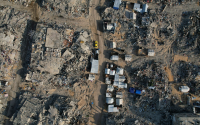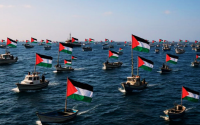David LeighThursday March 6, 2003The Guardian
Falluja 2 is one of the reasons Britain is planning to go to war. Listed as the headquarters of the Tariq state company, this £14m chemical plant was purchased from abroad in the 1980s to make chlorine, part one in a process from which outlawed chemical weapons such as mustard gas and the nerve gases tabun and sarin can be produced.
US satellite photos have pinpointed the vats and piping of the installation 50 miles outside Baghdad as a key part of the dictator's rebuilt armoury of potential chemical weapons.
Colin Powell, the US secretary of state, zeroed in on it last month. "Iraq has embedded key portions of its illicit chemical weapons infrastructure within its legitimate civilian industry," he told the security council in his dossier justifying war against Saddam.
"Iraq has rebuilt key portions of the Tariq state establishment. Tariq includes facilities designed specifically for Iraq's chemical weapons programme and employs key figures from past programmes. That's the production end of Saddam's chemical weapons business."
And last October the CIA claimed: "The best examples are the chlorine and phenol plants at Falluja 2. Falluja 2 was one of Iraq's principal CW production facilities. Iraq ... is trying to hide the activities of the Falluja plant."
Britain's top intelligence analysis body, the joint intelligence committee, chimed in with a heavyweight report published by Tony Blair around the same time: "Plants formerly associated with the chemical warfare programme have been rebuilt. These include the chlorine and phenol plant at Falluja 2."
The UN's weapons inspectors, led by Hans Blix, duly trawled through Falluja 2 last December. Mr Blix told the security council on January 27: "Iraq ... has repaired chemical processing equipment ... and had installed it at Fallujah for the production of chlorine and phenols."
What no one has yet reported on, however, is the secret of who built Falluja 2. It is a secret that has been hidden for 18 years, and one that some in Britain and around the world will regard as shameful.
We have discovered that the plant was sold and installed by a British company in Hounslow, Uhde Ltd.
British ministers in the Thatcher government knew there were clear signs of chemical warfare purpose, but gave it UK government financial backing. This support was provided on the instructions of the then Conservative trade minister Paul Channon, who told his officials to keep the deal secret.
Whitehall files obtained by the Guardian reveal that Mr Channon was undeterred by the prospect that the Falluja plant's products would contribute to the gassing of Iranians, whom Saddam was fighting. The files show he was informed about - as one senior Foreign Office civil servant wrote - "the strong possibility that the Iraqis wish to use it for the manufacture of mustard gas".
Mr Channon and his officials concealed the existence of the Falluja contract not only from the British public, but also from the US administration, which was trying to curb sales of chemical warfare equipment.
What is perhaps even more remarkable is that when final checks on the completed chlorine plant were interrupted in 1990 by the outbreak of the first Gulf war, the company successfully claimed £300,000 compensation from Britain's export credits guarantee department (ECGD), part of the Ministry of Trade.
As horribly burned and gassed Iranian troops were shipped to London for medical treatment in 1985, one Conservative politician, the junior Foreign Office minister Richard Luce, vainly tried to make a stand against allowing the Falluja chlor-alkali electroysis plant to be built.
He wrote to Mr Channon on March 8: "I consider it essential that everything possible be done to oppose the proposed sale and to deny the company concerned ECGD cover." He added: "We understand from the experts in the Ministry of Defence that production from such a factory could be used ... to manufacture chemical warfare agents."
Mr Luce said he was about to address a Geneva disarmament conference on Britain's "leading role" in trying to stop chemicals being used for warfare: "This makes it particularly important that we should avoid authorising the export of a plant which could be adapted for military purposes."
His letter followed a note about the chlorine plant from the head of the Middle East desk at the Foreign Office, Stephen Day, to his civil servant opposite number in the Department of Trade. Mr Day said: "A number of factors point to the strong possibility that the Iraqis wish to use it for the manufacture of mustard gas".
He added: "Mr Channon and Mr Luce have given assurances in the House of Commons that no items of equipment would be authorised for Iran or Iraq which it was thought would in any way contribute to the manufacture of chemical weapons ... Hostile critics would undoubtedly make much of any British involvement in such a project (particularly the provision of ECGD cover)."
At a meeting with Mr Channon on March 18, Mr Luce renewed his pleas. A minute by Mr Channon's private secretary records him arguing that "the Americans had appealed for us to stop" such exports. He added: "There were indications that the Iraqis were using chemicals again in their conflict with Iran."
But Mr Channon refused. On March 25 Mr Luce wrote to him finally saying: "I ... reluctantly agree" to the contract going ahead. Mr Channon's speaking notes for the meeting prepared for him by officials stressed: "British industry would resent a unilateral ban as an unreasonable commercial restraint ... A ban would do our other trade prospects in Iraq no good."
There remained two problems for Conservative ministers - the Americans and the British public. Mr Luce insisted as the price of his acquiescence that negotiations continue with the US to get a general ban on export of precursors, the chemicals made from chlorine which could be used to make mustard gas and nerve gas.
But both ministers agreed to conceal the existence of the Falluja 2 contract from the US. Mr Channon decided this at a meeting with his own officials on March 14, the records show. "The only way of being certain [about US regulations] is to ask the Americans; and we agreed not to do this at the minister's meeting yesterday".
A further "confidential" note from one of Mr Channon's officials after the two ministers met on March 19 also confirms: "It was agreed at the meeting that since the Americans were not involved in this contract it would be unwise to ask questions which drew their attention to it."
Mr Luce agreed, writing: "Officials here are in touch with the Americans on the question of further controls on chemicals ... (though for obvious reasons we do not wish to draw attention to chlorine plants)".
Mr Channon added: "If there are any immediate questions to ECGD, the latter will say that it is their practice not to comment on individual cases".
The old Etonian and Guinness heir Paul Channon has since become a Tory peer, Lord Kelvedon, of Kelvedon Hall in Essex.
Richard Luce has become Lord Chamberlain, a senior member of the Queen's household.
Saddam Hussein, having gassed an estimated 8,600 Iranians and Kurds by the time of the secret approval of this British contract, went on to gas another 18,000 of his opponents with mustard and nerve agents, including hundreds of Kurdish villagers at Halabja in March 1988.






